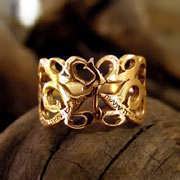This story is based on the legend of King Solomon, wisest of men. This tale appears in many different versions in many cultures all over the world, due to the fact that the principle that lies behind the ring is a principle that is relevant to all our lives as human beings.
King Solomon had an army commander named Benayahu Ben Yehoyada. It was during the Passover holiday, Solomon and the kingdom’s ministers convened for the holidays. At the time of the festive meal, King Solomon decided to sting his army commander Benayahu Ben Yehoyada, who was a conceited man. “Benayahu”, Solomon addressed the army commander,” I am in need of a special ring, a ring that has special power. This is a ring that when looked upon turns a sad man happy, and a happy man sad. I know that only you of all people can find such a ring. I need such a ring by the eve of the feast of Tabernacles, the next holiday eve that begins in half a year’s time. This way, you will have enough time to locate the ring.” The army commander did not doubt his own ability for a moment, and responded that he will find the ring.
 |
 |
|
| This too shall pass – gold | This too shall pass – silver |
The time passed and Benayahu searched for the ring in every possible place, he sent agents, checked registries, consulted elders, and despite all these attempts he was not able to find even a clue as to the existence of such a ring. Finally, the eve of the feast of Tabernacles arrived and Benayahu found himself wandering through the markets of Jerusalem. The Sun was beginning to set and the peddlers were busy shutting down their stalls. In his despair, the minister approached an old goldsmith and told him about the ring he was searching for. The goldsmith listened and then took out a simple gold ring and engraved on it three letters and presented it to the army commander. Benayahu looked at the ring and immediately smiled; this was exactly the ring he was looking for.
The Holiday Eve arrived and Solomon’s people convened. Solomon turned to Benayahu smiling, and asked him if he had found the ring. To Solomon’s surprise, the army commander took out a ring and presented it to the king. The king looked at the ring, looked at the beauty and splendor that surrounded him, he then looked around at his ministers and his smile vanished. On the ring were engraved three letters in Hebrew , ג.ז.י, (translated into English, four) T.T.S.P, initials for “THIS TOO SHALL PASS”….
The tale tells us that the understanding that all is ephemeral, and the knowing that all our power, wealth and influence here are temporary. This realization brought King Solomon to write the book of Ecclesiastes that deals with philosophical questions regarding the meaning of life and the pursuit of happiness.
On the center of the ring appears the three letters ג.ז.י while on the length of the ring is engraved the following verse in Hebrew from Ecclesiastes Chapter 1 verse 9
Translated into English:
“That which has been is that which will be, And that which has been done is that which will be done. So there is nothing new under the Sun.”
This simple truth is beyond cultural or religious concepts. When a Buddhist monk read
Ecclesiastes that was written by King Solomon he stated that it was written by the Buddha…
